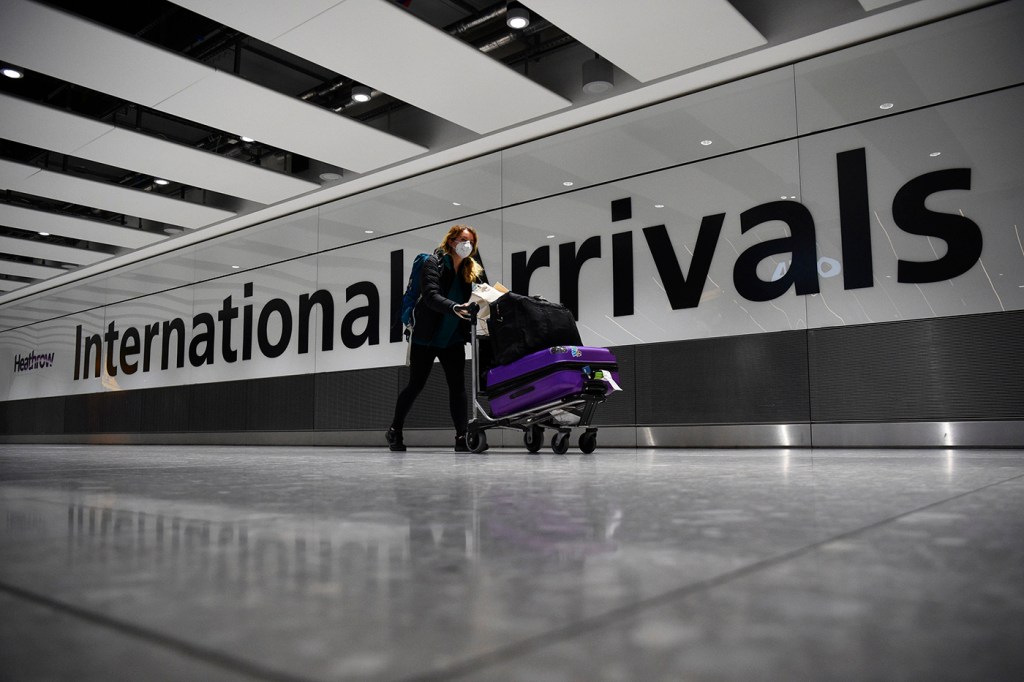Despite lifting of travel ban, tensions toward U.S. linger among European allies

Many vaccinated Europeans breathed a collective sigh of relief when the United States lifted an 18-month travel ban this week. The reciprocative gesture was a victory for diplomacy, and may have eased tensions, but the transatlantic relationship remains politically strained, according to Northeastern faculty experts in international relations.
The pandemic-related restrictions irked Britain and European Union nations, with some of their citizens taking to social media to air their frustrations. “Please follow science,” one person wrote on stopthetravelban.com. “(W)hy can Americans come to Europe and fly back and me, vaccinated, can’t enter?”
The ban will end in November, President Joe Biden said ahead of this week’s UN General Assembly meeting in New York. Still, there remains an air of unpredictability about America among the UK and EU, says Fiona Creed, an associate teaching professor at Northeastern who previously worked with the EU delegation to the UN.
“There was a sense in the EU countries that with Biden coming into power that there was going to be a change in relations” from the Trump administration, says Creed. Eight months into Biden’s term, “there’s a sense of mistrust with what the U.S. has done and has continued to do under Joe Biden, just simply because the EU in general hasn’t seen change.”
Biden’s foreign policy at this stage of his presidency is “still pretty undefined,” explains Julie Garey, an assistant teaching professor of political science who specializes in international relations and U.S. foreign policy.
The president is, to an extent, continuing former president Donald Trump’s tough stance on China and some immigration measures. There is likely to be divergence in areas such as Russia, North Korea, non-pandemic immigration, climate change, and even NATO as the Biden administration’s foreign policy agenda becomes clearer, Garey adds.
Adding to the lack of trust was the turbulent U.S. withdrawal from Afghanistan and the surprise announcement that the United States had entered into a three-way nuclear submarine deal with Britain and Australia, causing hurt feelings for America’s oldest ally, France, which lost out on the lucrative deal.
A livid President Emannuel Macron took the extraordinary step of yanking Paris’s envoys to Washington and Canberra.
“France is very, very angry at the moment with pretty much anyone and everyone,” says Pablo Calderon Martinez, an assistant professor in politics and international relations at Northeastern’s London campus at the New College of the Humanities.
The U.S. move was not only a snub to Macron on a personal level, but it isolates Britain even further from Europe, puts the United States in the uncomfortable position of having to pick sides between Britain and the EU, and makes it harder for the U.K., Europe, and America to cooperate on security matters, Martinez adds.
“There was no need to humiliate France like that,” he says. “At the end of the day, it’s impossible for Europe to function without the United States in terms of security, but it’s not impossible for Europe to function without the U.K. So it’s really putting the U.S. in a difficult situation in terms of who it’s going to support.”
Europe started preparing for a U.S.-less future before the Trump administration, and between the Afghanistan withdrawal and the Australian submarine deal, there’s likely to be some growing support for measures which further separate the security of the U.S. and the EU, says Garey.
While the envoy recall was a significant signal to the Biden administration about the boundaries Macron is trying to establish in U.S.-French relations, the countries have overcome prior run-ins with one another and remained friends, Garey adds.
“The U.S. and France have frequently found themselves at odds but have always maintained some kind of working relationship,” she says, pointing to examples such as the rift in the 1950s over the Suez Canal and France’s withdrawal in the 1960s from NATO’s military command (but not from the alliance entirely).
As for post-Brexit Britain, it is still trying to find its place in the world, and its relationship with other European countries is still a work in progress. “I still don’t think that has been fully defined,” says Creed.
A trade deal with America was supposed to be one of the motivating factors for Brexit, but Prime Minister Boris Johnson wasn’t able to secure a pledge during this week’s White House meeting with Biden. “Joe Biden is not very keen on a trade agreement with the U.K.,” Martinez says.
While the travel ban made for big headlines briefly in the European media, in the broader diplomatic picture, “it’s not going to do much to improve relations between Europe and the U.S.,” he adds.
For media inquiries, please contact media@northeastern.edu.





